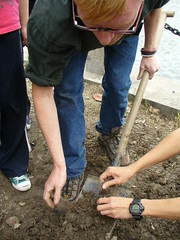You just need to learn the methods and implement them.
A terrific way to repel bugs from your garden is to plant garlic in a few places. The smell is unpleasant for many kinds of garlic will deter insects from inhabiting your garden. Be sure you plant them in an area that is going to be near pest-attracting plants.A benefit from planting garlic is that you can eat it.
Adjust your watering to the season and current climate. For instance, if your climate is humid and warm, humid climate watering the leaves can cause leaf fungus.
Botanical Insecticides
Research the local botanical insecticides which can be purchased locally to aid in deterring the pest population. Natural insecticides are often more powerful than synthetic pesticides. However, because botanical insecticides are biological, which makes them disappear more quickly.
You can simply make a new garden for your perennials with a few steps. Simply use a spade to cut underneath your turf, flip it over and cover with wood chips. Wait a few weeks before planting perennials into the brand new bed.
This is a very easy organic gardening attempts. Plan your landscaping with primarily native grasses, flowers, and grasses. Choose plants that are suitable for your climate conditions, to avoid the need for pesticide or fertilizer. Native plants will thrive with organically made compost.
Know exactly what you’d specifically like to grow within your organic garden. Different varieties of a certain flower or vegetable need different kinds of environments. For example, if you are planning on planting roses in your garden, but some will grow and bloom in your garden whereas others won’t. Make sure that you select the varieties that will adapt well to your garden.
Plant your landscaping trees in places that will provide shade for your house. Your trees can provide natural shade and so will your utility bill.
Use barrels or alternate containers to trap and store rainwater for your garden. This will save you from paying money in water your garden. Rainwater also really beneficial for plants.
This will help prevent any powdery mildew that could potentially ruin your plants. You will be able to store this mixture in your fridge for about three weeks. You can also use it once each day until you get the mildew is no longer a problem.
If you are constantly battling aphids, then good old soapy water may do the trick and solve your problem.
To get rid of unwanted garden pests, try blending up some chives, onion, or onion with water. To make the spray, just chop peeled garlic, onions or chives very fine and mix half a cup of water with it, then strain it into a spray bottle.
Your children will enjoy being involved with you in the organic garden. A garden can be a great learning experience for your children, and will give you an opportunity to bond with them while you produce healthy food.
If you want to maximize your success at organic gardening, you need to learn as much as you can about how to garden. Try using these organic tips.

